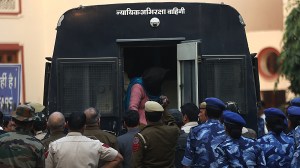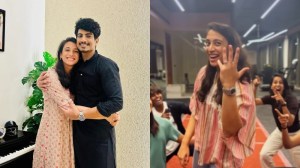Tale of two adoptions
Besides education and culture, Pune has a strong presence on the international map when it comes to adoption. Considered one of the premi...

Besides education and culture, Pune has a strong presence on the international map when it comes to adoption. Considered one of the premier centres for adopting babies, potential parents from all over the country and abroad visit the various adoption centres sprinkled across the city.
Quite poignantly, on the one hand, young and middle-aged couples from abroad come searching for their progenies-to-be. While, on the other hand, orphaned infants who have been residing for decades in their adopted homes in Europe descend on Pune to see for themselves their roots of origin. And in rare instances, to actually hunt for their biological mother!
I met 25-year-old Jenny Fischer a few days back. On January 20, 1974, she was abandoned at the Shivajinagar bus stop in Pune as a two-month-old infant. Twenty-five years later, she was sitting in a plush five-star hotel, about 5 km from where she was once abandoned, with a handsome French husband and two stunningly beautiful daughters.
She was vivacious, very articulateand came across as a very affectionate and intelligent woman. Her adopted parents hail from Sweden, where she spent most of her life in a picturesque countryside. She learnt Swedish, her mother tongue, and also excelled in English since her father was very particular about it. Then she set off for Paris in the early 1990s for graduation where she met this handsome lad.
Her dusky complexion and warm hospitality revealed her Indian identity — she offered me coffee at the hotel’s coffee shop and talked nineteen to a dozen, as if she had known me for ages. I asked whether she was emotionally disturbed over the (unknown) identity of her biological mother. “No,” she said, “I’m very happy with my adopted parents and have had a beautiful childhood. It is only when I became a mother three years back that the urge to see the woman who gave birth to me grew very strong. So I’m here to find some clues but have drawn a blank. Nevertheless, I think I’m happy having seen what is most probably my birthplace.” She thenshowed me a woven necklace of plastic beads, shocking pink and yellow in colour (which the rural folk in this country adorn), which she had around her neck when she was found abandoned. She preserves it like a treasure.
Eight months back, I met 19-year-old Jayant Van Peperstraten whose adopted parents were from Eindhoven in southern Holland. Jayant was admitted to the Sassoon General Hospital in 1981, as an 18-month-old baby but his mother absconded, never to return. So, Jayant was under the care of the Shreevatsa adoption home and soon he too flew to a picturesque land, where affection from his new-found parents and a luxurious lifestyle greeted him.
But quite unlike Jenny, Jayant grew up into an introvert and an unhappy teenager. And then, four years back he quite literally plunged into a chronic mental depression, said his uncle, Mario Van Diessen, “and has ever since been obsessed about who his real mother is” — which was why he escorted him to Pune in July 1998.
Unlike for Jenny, for Jayant thetour to Pune made him more depressed. He hardly talks to you since he can speak only in Dutch and doesn’t know English. He stares at you blankly as he smokes and you can actually see the “identity crisis” overpowering him. He might be materialistically well-off but he is still nagged by the fact that he cannot meet the one who gave him birth. And that his roots are not in the European country which gave him so much in his childhood. What does he want in life? To come back to Pune, he says, and keep his mission afire, that of finding his real mother.
Indeed a tale of two helpless creatures, not long back, thrown into similar heart-wrenching circumstances. But destiny had two different paths, when they set out on their journey. Happiness and Unhappiness. It’s all in the attitude, they say!



- 01
- 02
- 03
- 04
- 05




























